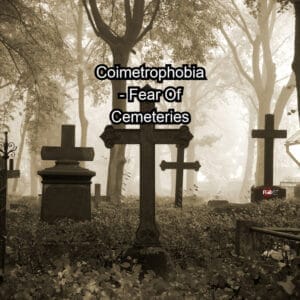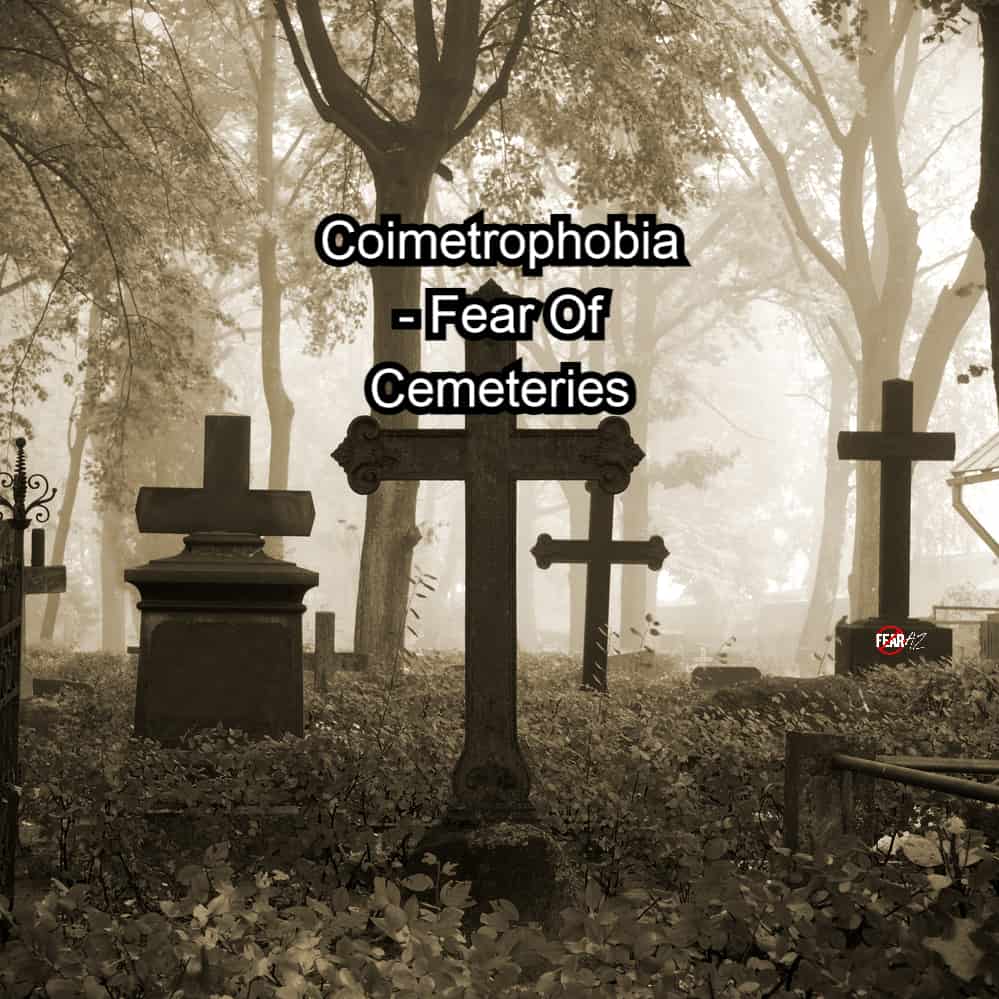Share This Article
The Excessive Fear of Cemeteries
Everyone’s a little anxious about visiting a cemetery. Whether it’s the grave of a young person who met an untimely death or that of an elder, visiting a grave may bring on a flood of memories that can mess with our emotions.
But are you so terrified of visiting a cemetery that the fear goes beyond normal anxiety? Do you go to great lengths to avoid going anywhere near a cemetery? Has it reached the point that it interferes with your daily life and functioning?
If so, you may have a fear of cemeteries.
Statistics say that at some point in their lifetime 12.5 percent of U.S. citizens suffer from some sort of phobia. Fortunately, awareness and understanding of different phobias have increased. There are countless different kinds of phobias, but if you’re here to learn about the fear of graveyards, read on to find out how to overcome it.

Coimetrophobia Meaning
What is the fear of graves called?
Coimetrophobia is the fear of graves. It is defined as the abnormal and persistent fear of cemeteries. A person who has this phobia is fearful of visiting a cemetery and can even become anxious at the mention of a graveyard, grave, or anything related to it. It may be a challenge for one with coimetrophobia to even think about a cemetery.
Why am I so afraid of cemeteries?
If you suffer with coimetrophobia, you may fear the unknown or feel there are ghosts or zombies present. Sometimes, the realization that you too will one day die and be buried at a cemetery leads to the development of this fear.
Movies and other forms of media play a large part in the development of this phobia as well. Graveyards are often portrayed as dangerous places. They are often painted as eerie, dark, uninhabited spaces haunted by spirits.
However, while sufferers often realize that their fear is irrational and things like spirits, zombies, and ghosts are only a product of fiction, others strongly believe in the presence of other beings who may try to harm them.
Why do I avoid cemeteries?
Those with a fear of cemeteries often choose avoidance as their coping mechanism. They may avoid visiting cemeteries at all costs. They may not attend funerals, even if they’re close to the deceased. And they may live as far from a cemetery as possible.
This practice of avoidance can eventually cause distress in the sufferer’s day-to-day life. They may drive a longer route just to avoid a cemetery or graveyard even if it means arriving late. Avoiding cemeteries gives the sufferer a false sense of security, something that becomes a bigger issue in the long run.
The problem with avoidance in coimetrophobia is, if left untreated, one may develop other related phobias such as samhainophobia (fear of Halloween), achluphobia (fear of darkness), and phasmophobia (fear of ghosts).
Causes of Coimetrophobia
Like most other phobias, the exact cause of coimetrophobia is unknown. However, several factors can lead to the development of the phobia.
Genetic Predisposition
Phobias are known to have a genetic link. People with a family history of mental illness are more prone to developing phobias, including coimetrophobia. However, it may take something like a traumatic event or chronic stress to trigger the development of the fear.
Experience
The phobia may start to develop after a terrifying experience, such as after going to a haunted house or watching a scary movie. Or if the person is naturally anxious or has a genetic predisposition to anxiety, a horror prank may have been the trigger for the phobia.
Media
As mentioned earlier, movies can play a big role in the development of the phobia. With most horror films depicting ghosts emerging from tombstones and zombies erupting from the grave, it’s no surprise that people associate evil and death with cemeteries and develop a phobia of them.
Symptoms of Coimetrophobia
Sufferers experience physical and emotional symptoms when faced with going to a cemetery. Some of the physical and psychological symptoms are:
Physical Symptoms
- Sweating
- Shakiness
- Muscle tension
- Irregular heartbeat
- Hot and cold flashes
- Nausea
- High blood pressure
- Dizziness
Psychological Symptoms
- Inability to think
- Panic attacks
- Anxiety at the thought of a cemetery
- Anxiety when present in a cemetery
People with a mild form of phobia may experience a few of these symptoms. However, people with severe coimetrophobia may experience several or all of the symptoms. Their condition can become so severe that they may experience panic attacks at the thought of a graveyard.
Treatment for Coimetrophobia
There is no definitive treatment for coimetrophobia, just as there is no definitive cause. However, what generally works for other specific phobias works for coimetrophobia as well. Often, a combination of self-help, professional therapy, and in severe cases, medication, are used to treat coimetrophobia.
Self-Help
Self-help is the most easily available form of treatment.
Read up on everything about the phobia, find out solutions to overcome stress and your symptoms, search for and join support groups, and so on. Basically, do everything in your power to get closer to a phobia-free you.
You can maintain a journal about your feelings and symptoms and track the direction you are going in. Determine whether self-help is assisting you, having no impact, or making matters worse before taking the next step.
You can try to expose yourself to the object of your fear by viewing images of cemeteries online or in books, or by simply talking about cemeteries to someone close to you.
You can discuss your feelings with someone you trust who will understand what you’re going through and help you through it.
The fact that you are accepting your condition and taking steps to treat it is commendable in itself.
Professional Therapy
Self-help won’t work if your phobia has progressed to the point where you frequently experience panic attacks. In this instance, seek professional therapy.
There are many treatment options available, and a mental health professional will be able to evaulate you and decide the best course of action. It’s possible that you’ll need to attend therapy sessions, where a therapist will work with you to rationalize your thoughts and ease your symptoms.
Also, while some patients may need a single therapy, others may require a combination of therapies. Some therapies used for the treatment of specific phobias like coimetrophobia are:
- Cognitive behavioral therapy (CBT)
- Dialectical behavioral therapy (DBT)
- Mindfulness-based stress reduction (MBSR)
- Exposure therapy
- Systematic desensitization
- Meditation
Medication
Medication, though rare, may be given alongside professional therapy. The dose is tapered down as the patient begins responding to other therapy methods and shows improvement.
Antidepressants and anti-anxiety drugs are generally prescribed, and their doses depend on how severe and extreme the phobia has become.
How to Cope with Coimetrophobia
Coimetrophobia affects your day-to-day life and should be dealt with as soon as possible. It can affect your socialization and limit you to the four walls of your home.
Also, those with untreated coimetrophobia have an increased risk of developing other phobias and mental health conditions such as anxiety and depression. In some cases, you may resort to self-medicating in order to clear your mind of unwanted thoughts.
Begin your journey to wellness by talking to friends, relatives, or anyone with whom you are comfortable.
Conclusion
The fear of cemeteries, or coimetrophobia, can be overwhelming and interfere with your daily activities. Start your therapy today by seeking support from loved ones. If that’s not enough, seek professionals who are experts in the field, know exactly what you’re going through, and can help you cope with it.




